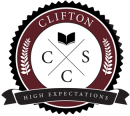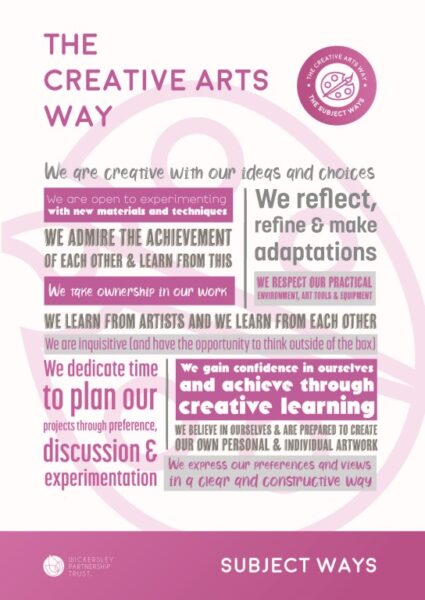Subjects
Textiles
The Subject Way
Firstly, to teach students the vital skills they need to achieve their full potential and gain the very best grades they can. Secondly, to teach students how each subject relates to the wider world, incorporating the life skills they will learn.
It is our belief that knowing how what you learn links to the wider world brings a subject to life and therefore improves overall understanding and engagement.
Why study Textiles?
TEXTILE DESIGN EXPLORES BOTH THE TECHNICAL AND CREATIVE ASPECTS OF TEXTILES; LEARNING ABOUT EXCITING AND VERSATILE USES IN HISTORICAL AND CONTEMPORARY CONTEXTS.
You will investigate the processes through drawing, designing and making textile products, developing skills in fabric construction and decoration. You will build on creative skills learnt in Year 8 Textiles through learning and doing, You will develop highly defined work to help you achieve your full potential at GCSE.
What will I learn about?
- You will study variety of textile methods, many different printing techniques, such as fabric printing, tie-dye, batik, embroidery, fabric construction, stitching, felting, fabric manipulation, weaving, collage, silk painting, and a range of embellishment techniques hand sewn and free machine
- You will explore a range of textile media, techniques and processes, including both traditional and new technologies
- You will learn how to use sketchbooks to support your work through drawing and painting
- You will look at the work of artists, designers and craftspeople to inspire your own work
- How to annotate and develop a working vocabulary and knowledge of specialist terms in
How will I be assessed?
- Unit 1 Portfolio of Work (one project in Y10, one in Y11) – Controlled Assessment (96 marks – 60%)
- Unit 2 Externally Set Task – Question papers issued from 1 January in Y11. 10 weeks of preparation time resulting in a 10 hours Exam spread over 2 You will respond to your own starting point (96 marks – 40%).
What do employers think about the subject?
All employers value a person who is creative and capable of solving problems independently.
Studying Textiles will encourage you to develop these skills as well as your making skills. Employers value this ‘hands on’ approach to education.
By opting for Textiles you will gain a skill which can be used in a variety of college courses and careers including; Fashion buyer, textile technologist, costume maker, costume designer, dress maker, and fashion designer
What are some of the skills I will need?
- You should enjoy drawing
- You should be creative and enthusiastic
- You should have an interest in the meaning behind art work and enjoy looking at the work of artists, craftspeople and designers
- You must be dedicated to working on coursework outside of lesson time
- It helps if you have a good attendance record and good organisational skills – these are essential for any
Year-by-Year Subject Breakdown
In Year 9 your child will study:
- A range of different Textile designers based on Natural form topic.
- How to set up and use a sewing machine safely
- A range of printing techniques, Poly printing, screen printing and Collograph printing
- A range of fabric dying techniques
- Explore paper textures and collage
- How to iron safely
- How to do a neat hem and seam
- A range of hand embroidery
- How to use image-maker effectively
- Develop painting and colour pencil skills
- Combine different surfaces and textures to work on
- Presentation in sketchbook and composition skills
- Annotation to a good level using subject-specific terminology and full sentences
Your child’s progress will be assessed using in-class quizzes and tests, summative assessments at the end of each half term and a cumulative test at the end of the year, which will test everything they have learnt throughout Year 9.
Typical homework your child might get in Year 9 is:
- Fortnightly research homework
- Practice drawing skills
- Photography homework
- Key terminology spellings
In Year 10 your child will study:
- Teacher-Led workshops refining skills already taught
- Interpretation from primary into the style of an artist
- Develop techniques already taught
- Mixed media including collage
- Free machine embroidery
- Silk painting
- Image transfer paper
- Respond to a brief
- Study Contemporary and historical artists, craftspeople and designers from different cultures and their contribution to continuity and change in society
- Create a final composition
- How to develop a working vocabulary and knowledge of specialist terms in Textiles
Your child’s progress will be assessed using in-class quizzes and tests, summative assessments at the end of each half term and a mock exam at the end of the year, which will test everything they have learnt throughout Year 10.
Typical homework your child might get in Year 10 is:
- Weekly Research
- Annotation
- Practise drawing techniques
In Year 11 your child will study:
- Developing their strengths and knowing how to reach their full potential
- A mock exam for 12 weeks that will run from September to December
- How to create a personal and meaningful response to a textiles interpretation
- In January they will get their textiles exam to prepare for during 12 weeks and will then sit a 10-hour exam around Easter to create a final piece
- How to annotate and develop a working vocabulary and knowledge of specialist terms in Textiles
- Developing imaginative and intuitive ways of working
Your child’s progress will be assessed using in-class quizzes and tests, summative assessments at the end of each half term and mock exams at two set points during the year, which will test everything they have learnt throughout Year 11.
Typical homework your child might get in Year 11 is:
- Weekly personalised homework tasks
- Weekly deadlines to meet
- Annotation
Find out more
If you would like more information about our curriculum, please contact Mrs Leng, Headteacher using the details on our contact page.




